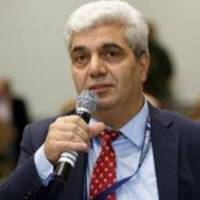
Is Russia’s Containment Still Possible? Case-study on the South Caucasus  By Benyamin Poghosyan, PhD, Executive Director, Political Science Association of Armenia
By Benyamin Poghosyan, PhD, Executive Director, Political Science Association of Armenia
Since 2014, the containment of Russia has been one of the most popular topics within the expert community dealing with Geopolitics and Geostrategy. This term has been actively used by the Western political circles, including high level state officials and senior leaders of NATO. The Russian officials also use this term to describe Western, and, in particular, US policy towards Moscow. However, despite emphasizing the necessity to contain Russia in the post-Soviet space, including in the South Caucasus, little if anything is being done to change the geopolitical status quo. READ MORE
- EGF Editor |
Published on EGF: 09.02.2018
| External Relations
-
Armenia’s U-turn back to ‘multi-vector foreign policy’  By Stepan Grigoryan, Head, Analytical Centre for Globalisation and Regional Cooperation, Armenia
By Stepan Grigoryan, Head, Analytical Centre for Globalisation and Regional Cooperation, Armenia
The statement from the President of Armenia in September 2013 sounded like a bolt from the blue. He would not sign the Association Agreement with the European Union at the planned November Eastern Partnership Summit in Vilnius, he said. Instead, Armenia would be joining the Russian led Eurasian Economic Union (EAEU). This signified Armenia's departure from a multi-vector foreign policy. READ MORE
- EGF Editor |
Published on EGF: 16.01.2018
| External Relations
-
The Current State and the Prospects of Armenia - Turkey Relations
 By Benyamin Poghosyan, PhD, Executive Director, Political Science Association of Armenia
By Benyamin Poghosyan, PhD, Executive Director, Political Science Association of Armenia
Since gaining independence in 1991 Armenia has faced tough challenges in building relations with two of its four neighbors – Azerbaijan and Turkey. Relations with Azerbaijan were mainly influenced by Karabakh conflict. Armenia was supporting Nagorno Karabakh Armenians to defend themselves against Azerbaijani aggression. The end of hostilities in 1994 and the signature of a ceasefire agreement did not bring up peace, and negotiations are still underway, for the last 23 years, to find a mutually accepted settlement. READ MORE
- EGF Editor |
Published on EGF: 09.01.2018
| External Relations
-
The Russian Hug is Eternal  By By Benyamin Poghosyan, PhD, Executive Director, Political Science Association of Armenia
By By Benyamin Poghosyan, PhD, Executive Director, Political Science Association of Armenia
Russian understanding of geopolitics believes in the decisive role of hard power and military might as a key component of both domestic and foreign policy. Russian-led integration projects, aim to include as many post-soviet states as possible, and once in never let them go out.
In recent years one of the main issues in post-Soviet geopolitics is the competition between Russian and EU promoted integration projects. The Eastern Partnership promoted by the EU offers closer ties with Europe through Association Agreements and the establishment of Free Trade Areas, though with no guarantees of membership into the EU. The Russian-led Eurasian Economic Union promotes integration between former Soviet Union states. READ MORE
- EGF Editor |
Published on EGF: 18.12.2017
| External Relations
-
Everyone is happy with the new Armenia-Russia-EU threesome  By Benyamin Poghosyan, PhD, Executive Director, Political Science Association of Armenia
By Benyamin Poghosyan, PhD, Executive Director, Political Science Association of Armenia
Armenia, the European Union and Russia had more to gain than lose from the signing of the new Armenia - EU enhanced co-operation agreement. Paradoxically Armenia's membership of the EAEU was transformed from a liability into an asset during Yerevan's second attempt at negotiations with the EU.
On November 24, 2017 Armenia and EU signed a Comprehensive and Enhanced Partnership Agreement (CEPA) during the Eastern Partnership Brussels summit. The negotiations were launched in December 2015, and the agreement was initialled in March 2017. This was the second attempt to sign a new agreement between Armenia and EU. In 2010 – 2013, negotiations were held to elaborate an Association Agreement (AA), including the establishment of the Deep and Comprehensive Free Trade Area. READ MORE
- EGF Editor |
Published on EGF: 29.11.2017
| External Relations
-
An Armenian-Georgian strategic relationship can help both countries face geo-political challenges  By Benyamin Poghosyan, PhD, Executive Director, Political Science Association of Armenia
By Benyamin Poghosyan, PhD, Executive Director, Political Science Association of Armenia
Georgia and Armenia need to develop a strategic relationship in order to see off a number of geo-political challenges.
Armenia and Georgia are both facing tough foreign policy challenges. Armenia has to deal with constant, joint, Azerbaijani-Turkish pressure over the Nagorno-Karabakh conflict. Another hard task is the effort to develop relations with the Euro-Atlantic institutions, whilst simultaneously not jeopardizing strategic relations with Russia. The alliance with Moscow is itself a challenge given Armenia's overdependence on Russia, and Russia's growing cooperation with Turkey and Azerbaijan. READ MORE
- EGF Editor |
Published on EGF: 22.11.2017
| External Relations
-
Armenia, Georgia, Azerbaijan: Foreign Policy Opportunities and Challenges  By Benyamin Poghosyan, PhD, Executive Director, Political Science Association of Armenia
By Benyamin Poghosyan, PhD, Executive Director, Political Science Association of Armenia
All three internationally recognized republics of the South Caucasus – Armenia, Azerbaijan and Georgia - are facing hard challenges in pursuing their foreign policies. They have to take into account contradicting/coinciding interests of regional and global actors involved in the region. The main purpose of this article is to analyze the main challenges and opportunities of Armenian, Georgian and Azerbaijani foreign policies with a focus on their interactions with Russia and the West. READ MORE
- EGF Editor |
Published on EGF: 14.11.2017
| External Relations
-
Tensions test the resilience of the US-Turkey alliance  By Benyamin Poghosyan, PhD, Executive Director, Political Science Association of Armenia
By Benyamin Poghosyan, PhD, Executive Director, Political Science Association of Armenia
A raft of issues are complicating relations between long-time allies Turkey and the United States. But both sides continue using diplomatic back-channels to get as many concessions as possible from each other without fatally harming bilateral relations.
US - Turkey relations are probably at their lowest point since the start of the Cold War in late 1940s. Turkey, as a NATO member, played a key role in fortifying the alliance's southern flank against the Soviet threat. The collapse of the Soviet Union created new geo-strategic conditions, and both the US and Turkey were in quest of new rationales for fostering their relationship. In the 1990s, Turkey was perceived in the US as a potential model on how to develop democratic institutions in newly independent republics with Muslim majority populations from the Caucasus and Central Asia. READ MORE
- EGF Editor |
Published on EGF: 23.10.2017
| External Relations
-
A new crisis in US-Iran relations is unwelcome in the South Caucasus  By Benyamin Poghosyan, PhD, Executive Director, Political Science Association of Armenia
By Benyamin Poghosyan, PhD, Executive Director, Political Science Association of Armenia
President Trump's decertification of the Iran deal will put in jeopardy a number of regional projects.
One of the key events shaping the geopolitics of the Middle East in the coming days most probably will be the US President Donald Trump's decision to decertify Iran nuclear deal (formally called the Joint Comprehensive Plan of Action - JCPOA), signed in 2015. President Trump has been a vocal opponent of the deal since he entered the Presidential race, and continued his tough stance on Iran after his election. The latest vivid example of this approach was President Trump's speech at the 72 Session of the UN General Assembly in September. READ MORE
- EGF Editor |
Published on EGF: 17.10.2017
| External Relations
-
